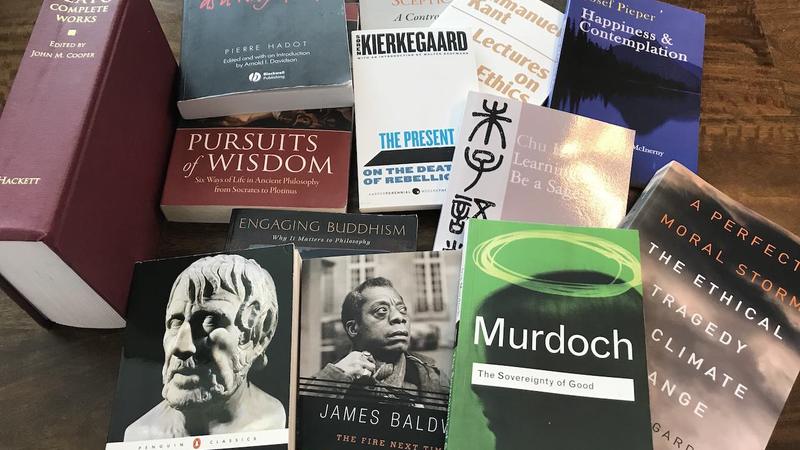I am continuing a series of interviews with journal editors (see the previous entry with Anna Marmodoro) with Thornton Lockwood, editor of Polis: The Journal for Ancient Greek and Roman Political Thought. Thornton is Professor of Philosophy at Quinnipiac University and the Program Director of the First-Year Seminar. He received a BA in history from Hamilton College, a MA in the Liberal Arts from St. John’s College (Annapolis), and a Ph.D. in Philosophy from Boston University. His scholarly research focuses on ancient Greek and Roman ethical and political thought and its subsequent reception. He has co-edited two volumes, Aristote Politique VII: La constitution « selon nos vœux » (Polis, 2019) and Aristotle’s…
-
-
Opportunity to Sign Open Letter by Junior Philosophers to OUP and OSAP’s Editorial Board
I have recently documented serious issues with response times and editorial practices at Oxford Studies in Ancient Philosophy. In light of that, I sent my own personal open letter to OSAP’s editorial board and Peter Momtchiloff, the editor at Oxford University Press. I then published Peter Momtchiloff’s response. Now a group of junior ancient philosophers have come together to write their own letter asking for specific changes in editorial practices at OSAP that they believe would make ancient philosophy a more welcoming space for philosophers from marginalized groups. I was not involved in drafting this letter, though I agree with the concerns they articulate and have requested that my name…
-
Virtual Dissertation Groups Signup
I’m writing to highlight the dissertation writing workshop groups for philosophy graduate students that Joshua Smart organizes. Sign-ups are through January 16. There are usually several students in ancient philosophy participating, so it’s likely that ancient philosophy people who sign up will be placed in a Greek and Roman philosophy group. Here’s his announcement: Do you or someone you love suffer from writing-a-philosophy-dissertation? Then you should check out Virtual Dissertation Groups! What it is: VDG is a free service for those working on their doctoral dissertations in philosophy. Since 2014, we’ve connected students from over 30 countries to provide peer feedback on dissertation work with a minimal time commitment. How it works: Each…
-
Online Ancient Greek Reading Groups
A number of participants in the Ancient Greek and Roman Philosophy Network are interested in online reading groups. We are tentatively planning on starting ancient Greek reading groups on Plato, Aristotle, and late ancient texts. They will probably meet every other week. If you’re interested in participating in any of the reading groups (Plato, Aristotle, or late ancient), send an email to ancientphilosophyevents AT gmail.com by Monday, June 1 with 1) your name, 2) your email address, and 3) which group(s) you are interested in. I will follow up with group members on dates, times, texts, and format that week. All potential participants will be able to share their available…
-
Ancient Greek and Roman Philosophy Network Facebook Group
Due to the Covid-19 pandemic, many events have been cancelled and many of us cam no longer be as active in person. To connect scholars online, I’ve set up an Ancient Greek and Roman Philosophy Network Facebook group. It’s a forum for scholars working in any area of ancient philosophy, from Thales of Miletus through to Boethius and Byzantium, in order to create a greater sense of community within a field that features scholars from many different backgrounds, perspectives, and locations. All members are encouraged to share ancient philosophy related events, questions, books and articles (including their own), and teaching materials. Any scholar with an interest in ancient philosophy, whatever…
-
Resources for Online Teaching
As more and more philosophy instructors need to move classes online due to COVID-19, many of us are looking for help with teaching virtually. Mary Beth Willard (Weber State University) has shared some great general tips for quickly switching your course to an online format. It also makes sense to use resources that are already out there. I just assigned two podcasts from the History of Philosophy without any gaps to my History of Ancient Philosophy class, as the best way to introduce them to Aristotle, whom we are considering next. You should also check out (and add to) this spreadsheet (created by Liz Jackson (ANU) and Tyron Goldschmidt (Rochester)…
-
PhiLife Site Launches!
The Mellon Philosophy as a Way of Life Network website is now live: philife.nd.edu Our official website for the project features a pump-up video, bios of involved faculty and staff, teaching resources, and lots of information about our project ambitions. Check it out here! We are also looking for help in making the digital side of this project even better. If you have any materials for our Resource page (syllabi, assignments, grading materials, videos, anything!), please pass them on. We are looking for any non-copyright materials that you find useful in teaching or researching philosophy as a way of life. We are also looking for blog posts about Philosophy as…
-
Deadline Day for Drafts Exchange and Mellon Philosophy as a Way of Life Project Applications
Today is the deadline for letters of intent for the Mellon Philosophy as a Way of Life Project, a new initiative to help scholars effectively teach philosophy as a way of life! If you teach philosophy at a post-secondary institution and are interested at all, please check out philife.nd.edu and consider submitting a letter of intent. Today is also the deadline for the second round of ancient philosophy paper draft exchanges, so take your chance and sign up now.
-
PEA Soup Review Forum on Plato’s Moral Psychology by Rachana Kamtekar
PEA Soup is doing an Ethics review forum on Rachana Kamtekar’s Plato’s Moral Psychology (OUP 2018), reviewed by Nicholas Smith. You can join in discussion on the forum starting on the morning of Friday, January 11.
-
Ancient Philosophy Syllabi Collection Project
I’m starting a new project to collect and analyze syllabi from surveys of ancient Greek and Roman philosophy. My goals are to get a better sense of how teaching is currently being conducted, share ideas for course designs, highlight neglected but promising texts, and consider new approaches. I think it will be helpful to see what the selection of topics and readings looks like in current teaching. To what degree are surveys of ancient Greek and Roman philosophy still dominated by Plato and Aristotle? Do surveys spend time on early Greek philosophers? Do they include any Hellenistic or late ancient philosophers? I am also interested in topical coverage. Do most surveys…





